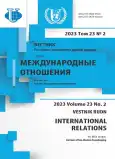The Shanghai Spirit and the ASEAN Way as the Foundations of a New Regionalism
- Authors: Honrada G.J.1, Bokeriya S.A.1
-
Affiliations:
- RUDN University
- Issue: Vol 23, No 2 (2023): Contours of Non-Western Peacekeeping
- Pages: 253-264
- Section: THEMATIC DOSSIER
- URL: https://journal-vniispk.ru/2313-0660/article/view/320478
- DOI: https://doi.org/10.22363/2313-0660-2023-23-2-253-264
- EDN: https://elibrary.ru/JKVFZS
- ID: 320478
Cite item
Abstract
Narratives are essential for organizations and states to provide a framework for their decision-making processes and organizational structure and bolster their legitimacy by appealing to shared values and worldviews. These narratives will play a greater role in a multipolar world characterized by a diversity of worldviews and values that shape the internal and external perceptions of international actors. The authors compare the critical narratives forwarded by the Shanghai Cooperation Organization (SCO) and the Association of Southeast Asian Nations (ASEAN), namely the Shanghai Spirit and the ASEAN Way. Drawing on scientific works dedicated to explicating the worldview, values, and norms espoused by the Shanghai Spirit and the ASEAN Way, the authors use syncretic approaches to show how these concepts are applied in these narratives. The Shanghai Spirit is based on mutual trust, mutual benefit, quality, respect for the diversity of civilizations, and the pursuit of common development. Similarly, the ASEAN Way is based on non-interference, non-confrontation, non-use of force, and consensus-based decision-making. The Shanghai Spirit and the ASEAN Way have notable similarities, such as an emphasis on preserving sovereignty, a pragmatic approach to regionalism, and a flexible, non-binding application. Although they also have significant differences, such as the rationale behind them, different preferred means of cooperation, and an emphasis on state security versus human security. The article argues that the unique features of the Shanghai Spirit and the ASEAN Way, which promote loose regionalism, combined with the state-centric Westphalian features of the contemporary international system, result in a new form of regionalism that is open yet preserves and reinforces the individual sovereignty of states. In this sense, the Shanghai Spirit and the ASEAN Way may provide the intellectual basis for a new form of regionalism and international relations that can better respond to the emerging challenges of a multipolar world.
About the authors
Gabriel Joel P. Honrada
RUDN University
Email: honradagabriel@gmail.com
ORCID iD: 0000-0001-6810-2650
Assistant, Department of Theory and History of International Relations
Moscow, Russian FederationSvetlana A. Bokeriya
RUDN University
Author for correspondence.
Email: bokeria-sa@rudn.ru
ORCID iD: 0000-0002-9052-4363
PhD (Law), Associate Professor, Department of Theory and History of International Relations
Moscow, Russian FederationReferences
- Acharya, A. (1999). Imagined proximities: The making and unmaking of Southeast Asia as a region. Southeast Asian Journal of Social Science, 27(1), 55-76.
- Alimov, R. (2018). The Shanghai Cooperation Organization: Its role and place in the development of Eurasia. Journal of Eurasian Studies, 9(2), 114-124. https://doi.org/10.1016/j.euras.2018.08.001
- Aminuddin, F., & Purnomo, J. (2017). Redefining ASEAN Way: Democratization and intergovernmental relations in Southeast Asia. Journal of ASEAN Studies, 5(1), 23-36.
- Aris, S. (2011). Eurasian regionalism: The Shanghai Cooperation Organization. London: Palgrave MacMillan.
- Aris, S. (2013). Shanghai Cooperation Organization: Mapping multilateralism in transition No. 2. New York: International Peace Institute.
- Bailes, A., Dunay, P., Guang, P., & Troitskiy, M. (2007). The Shanghai Cooperation Organization. Stockholm: Stockholm International Peace Research Institute.
- Caballero-Anthony, M. (2014). Understanding ASEAN’s centrality: Bases and prospects in an evolving regional architecture. The Pacific Review, 27(4), 563-584. https://doi.org/10.1080/09512748.2014.924227
- Caballero-Anthony, M. (2022). The ASEAN Way and the changing security environment: Navigating challenges to informality and centrality. International Politics, 1-21. https://doi.org/10.1057/s41311-022-00400-0
- Dingwerth, K., & Witt, A. (2019). Legitimation contests: A theoretical framework. In K. Dingwerth, A. Witt, I. Lehmann, E. Reichel & T. Weise (Eds.), International organizations under pressure (pp. 29-61). Oxford: Oxford University Press.
- Fei, Gao. (2010). The Shanghai Cooperation Organization and China’s new diplomacy. Clingendael: Netherlands Institute of International Relations ‘Clingendael’.
- Freire, M. (2018). The Shanghai Cooperation Organization. In A. Tsygankov (Ed.), Routledge handbook of Russian foreign policy (pp. 400-409). Oxfordshire: Routledge.
- Goh, E. (2008). Great powers and hierarchical order in Southeast Asia: Analyzing regional security strategies. International Security, 32(3), 113-157.
- Jia, Qingguo. (2007). The Shanghai Cooperation Organization: China’s experiment in multilateral leadership. In A. Iwashita (Ed.), Eager eyes fixed on Eurasia (pp. 113-123). Sapporo: Slavic-Eurasian Research Center.
- Jones, D., & Smith, M. (2007). Making process, not progress: ASEAN and the evolving East Asian regional order. International Security, 32(1), 148-184. Retrieved from https://www.jstor.org/stable/30129804
- Kliem, F. (2018). ASEAN imperfect: The changing nature of Southeast Asian regionalism. Bonn: Konrad-Adenauer-Stiftung.
- Mahadevan, J. (2012). The Mandala model of power and leadership: A Southeast Asian perspective. In G. Prastacos, F. Wang & K. Soderquist (Eds.), Leadership through the classics (pp. 363-374). Berlin: Springer-Verlag Berlin Heidelberg. https://doi.org/10.1007/978-3-642-32445-1_24
- Maulaya, M. (2021). Barriers to Shanghai Cooperation Organization (SCO) to pave road for suprationalism. Intermestic: Journal of International Studies, 5(2), 230-251. http://dx.doi.org/10.24198/intermestic/v5n2.4
- Noortman, M. (2016). ASEAN and its people: Regional internationalism and the politics of exclusion. In M. Maass (Ed.), Foreign policies and diplomacies in Asia: Changes in practice, concepts, and thinking in a rising region (pp. 93-108). Amsterdam: Amsterdam University Press. https://doi.org/10.1017/9789048519101.005
- Padmakumara, S. (2021). A conceptual analysis on ‘ASEAN Way’ as a normative approach for conducting regional affairs. Faculty of Graduate Studies - Colombo Journal of Multi-Disciplinary Research, 6(1), 1-12. Retrieved from https://fgs.cmb.ac.lk/wp-content/uploads/Vol-06-No-01-1-12.pdf
- Rahman, K. (2007). The Shanghai Cooperation Organization: Prospects and opportunities. Policy Perspectives, 4(1), 129-136.
- Tobing, D. H. (2018). The limits and possibilities of the ASEAN Way: The case of Rohingya as humanitarian issue in Southeast Asia. KnE Social Sciences, 3(5), 148-174. https://doi.org/10.18502/kss.v3i5.2331
- Xue, Yamei, & Makengo, B. M. (2021). Twenty years of the Shanghai Cooperation Organization: Achievements, challenges and prospects. Open Journal of Social Sciences, 9(10), 184-200. https://doi.org/10.4236/jss.2021.910014
- Yates, R. (2016). ASEAN as the ‘regional conductor’: Understanding ASEAN’s role in Asia-Pacific order. The Pacific Review, 30(4), 443-461. https://doi.org/10.1080/09512748.2016.1264458
- Zhao, Xiaodong. (2012). The Shanghai Cooperation Organization and counter-terrorism cooperation. Stockholm: Institute for Security & Development Policy.
Supplementary files









